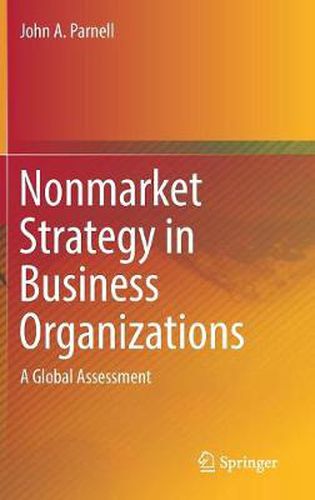Readings Newsletter
Become a Readings Member to make your shopping experience even easier.
Sign in or sign up for free!
You’re not far away from qualifying for FREE standard shipping within Australia
You’ve qualified for FREE standard shipping within Australia
The cart is loading…






This title is printed to order. This book may have been self-published. If so, we cannot guarantee the quality of the content. In the main most books will have gone through the editing process however some may not. We therefore suggest that you be aware of this before ordering this book. If in doubt check either the author or publisher’s details as we are unable to accept any returns unless they are faulty. Please contact us if you have any questions.
This book explores nonmarket strategy (NMS) in firms by invoking economic, political and philosophical perspectives. Featuring data from the USA, the UK, India, China, Mexico and other countries, the author links NMS to economic freedom, regional development, corruption and other national factors.
Nonmarket strategy (NMS) refers to any part of a firm’s strategy that seeks to generate superior performance through means not directly associated with market activity, such as lobbying legislators, colluding with rivals to erect industry entry barriers and pursuing direct business-government partnerships. Decades ago, nonmarket factors comprised a minor, peripheral consideration in organizational strategy. Today, NMS is central to strategy development and execution. This phenomenon is driven by both corruption in emerging economies and cronyism in the developed world. Scholarly interest in NMS continues to increase and while much is known about the topic, some core questions still remain such as: Are there different drivers for and implications of proactive NMS versus defensive NMS? How do national environments influence firm decisions to pursue NMS? The data presented in the book explores many of these questions.
Providing a comprehensive, multidisciplinary analysis that includes elements of management, economics, philosophy and social sciences, this book is beneficial for scholars, practitioners, students, academics and policy makers interested in NMS.
$9.00 standard shipping within Australia
FREE standard shipping within Australia for orders over $100.00
Express & International shipping calculated at checkout
This title is printed to order. This book may have been self-published. If so, we cannot guarantee the quality of the content. In the main most books will have gone through the editing process however some may not. We therefore suggest that you be aware of this before ordering this book. If in doubt check either the author or publisher’s details as we are unable to accept any returns unless they are faulty. Please contact us if you have any questions.
This book explores nonmarket strategy (NMS) in firms by invoking economic, political and philosophical perspectives. Featuring data from the USA, the UK, India, China, Mexico and other countries, the author links NMS to economic freedom, regional development, corruption and other national factors.
Nonmarket strategy (NMS) refers to any part of a firm’s strategy that seeks to generate superior performance through means not directly associated with market activity, such as lobbying legislators, colluding with rivals to erect industry entry barriers and pursuing direct business-government partnerships. Decades ago, nonmarket factors comprised a minor, peripheral consideration in organizational strategy. Today, NMS is central to strategy development and execution. This phenomenon is driven by both corruption in emerging economies and cronyism in the developed world. Scholarly interest in NMS continues to increase and while much is known about the topic, some core questions still remain such as: Are there different drivers for and implications of proactive NMS versus defensive NMS? How do national environments influence firm decisions to pursue NMS? The data presented in the book explores many of these questions.
Providing a comprehensive, multidisciplinary analysis that includes elements of management, economics, philosophy and social sciences, this book is beneficial for scholars, practitioners, students, academics and policy makers interested in NMS.